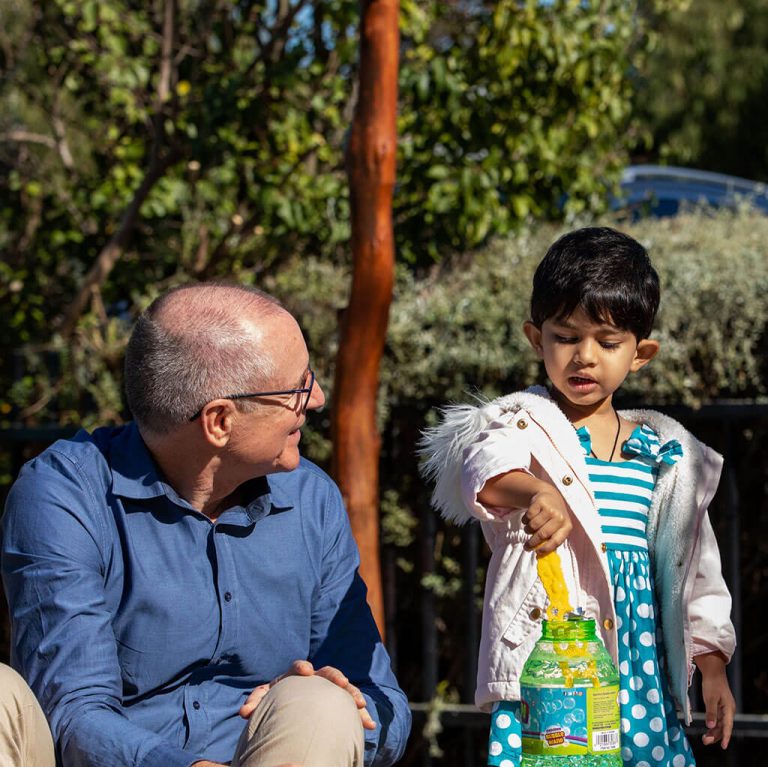Educators share their stories ahead of Thrive by Five National Press Club address

Thrive by Five CEO Jay Weatherill and Minderoo Foundation co-founder Nicola Forrest will address the National Press Club today, about the need they see for Australia to have an holistic, prenatal to school, universally accessible, high-quality early learning system.
Whilst in the Nation’s capital, Mr Weatherill and Ms Forrest have a number of meetings with MPs and decision makers, and have taken with them a “book of stories” from educators and other supporters of the early childhood education and care (ECEC) sector, prepared in the lead up to the visit.
In the extracts below, we share some educator insights from the stories shared with Thrive by Five. In order to protect the anonymity of the authors, first name and state have been shared, and The Sector has chosen to identify people simply with the job title “educator”.
Pay and conditions
Queensland-based educator Anne has been working in the sector for 39 years, with experience in two different states, and in a number of ECEC contexts. As well as working directly with children, Anne has held positions with the State Government and has worked as a lecturer at TAFE and University.
When asked for a message to send to decision makers in Canberra, Anne was forthright.
“After a long career in early childhood education I am astounded that the sector has not progressed in its valuing of the dedicated, hard working professionals nor working conditions,” she said.
Anne describes a hierarchical system, where pay and conditions peak in state education and trough in long day care settings. Even with postgraduate qualifications, Anne is not recognised as a “teacher” in the eyes of society, simply because she chooses to work with children in the years before formal schooling begins.
“I love early childhood education, I value play-based learning and acknowledge the immense importance of quality early childhood learning experiences. It is the most joyous sector of education (and government departments) in which to work,” she explained.
Despite her love for the ECEC sector, Anne ‘despairs’ for the future of the profession, fearing that early childhood education graduates will be lost to primary school education because the pay, conditions and career opportunities are viewed as being better.
“We are not attracting the best and most passionate early childhood teachers in prior to school settings – when neuroscience is shouting out that this is the age range that needs quality teachers,” she said.
Speaking directly to decision makers, Anne cut to the chase, asking politicians to “please value our early childhood profession. Improve pay and working conditions so that the sector attracts high-quality educators – who want to stay for the long term. Put children aged birth to five years first – invest heavily in early childhood education and the community will reap the rewards later in primary, secondary and higher education. Education is key to a prosperous economy and GDP, but our youngest citizens (and their educators) must be prioritised now!”
Reduction of costs for families
Leonie reflected on the recent fee-free period of ECEC learning, which was brought about due to COVID-19. When cost was no longer a barrier, Leonie noted that the children using her service with additional needs benefited from having extra days in the service.
“What we observed was a huge increase in children’s development,” she said, expressing concern that, for some families, children’s development is hindered by the Activity Test rules underpinning the childcare subsidy.
Removing the cost barrier also meant many women who accessed the service had the ability to take on extra shifts and work.
“Again, this really showed us the impact on the high cost of childcare. Females could place their children in care in line with their work requirements without the huge burden of the cost of care,” Leonie said.
Her thoughts were echoed by an educator from Western Australia, who elected not to share their name, but who outlined that, during their 35 years in the ECEC field, they have observed “a big change” in the number of vulnerable children who need access to ECEC, and in the number of parents who need support.
“I have found that the cost of childcare is difficult for some families, especially the one-parent families and/or the families from low socio-economic areas,” the educator shared.
“I believe that some families need help, and as they cannot afford care it gets to a point of them attending as children at risk. If early childhood education was made more affordable I believe that we could help families before it gets to that stage.
In sharing their message directly to policy makers, the WA educator said: “Families with children with additional and behavioural needs should have access to sending their child to a centre if they need some time away to have a break, and with that be a better parent. Please look at the benefit for not only the children but the families as well. Please help the families by making early childhood education more affordable”
Professional identity
The WA educator went on to note their disappointment that the ECEC profession “is not valued by the government or the community”.
“When you tell someone you work in this (sector), they automatically say: “Oh, babysitting”.
“There is so much documentation about the positive effect care has for young children and I am disappointed that the only time it gets a mention is always when something negative has happened. It is a privilege to be part of a young child’s journey at the centre and to know that you have made a difference that will stay with them forever.”
School readiness
Karyn, a primary school educator and play therapist from Victoria, shared her perspective from a private practice lens, noting an increase in the number of children she is supporting who come to school “not socially, emotionally or developmentally ready for learning”.
“I question the systems and processes in place for what is considered to be the most important part of a child’s life,” Karyn said.
“The first five years are where a strong foundation is created for not only future learning but for life. Extensive resources, money and time is spent by primary schools, ‘filling the gaps’, ensuring that children can thrive. It is time we became proactive rather than reactive.”
Mr Weatherill and Ms Forrest will commence their address at 12:30 pm, ACST. Further details are available here.
Popular

Economics
Provider
Quality
Workforce
3 Day Guarantee comes into effect: New CCS rules unlock access for families and children
2026-01-05 06:30:55
by Fiona Alston

Workforce
Events News
Practice
Provider
Quality
Research
Mary MacKillop Announced as Finalist for FIA 2026 Best Transformational Gift Award
2026-01-06 06:30:50
by Fiona Alston

Practice
Provider
Quality
Workforce
SOEL celebrates over 50 years as a family-owned business in WA
2026-01-06 08:00:51
by Contributed Content














